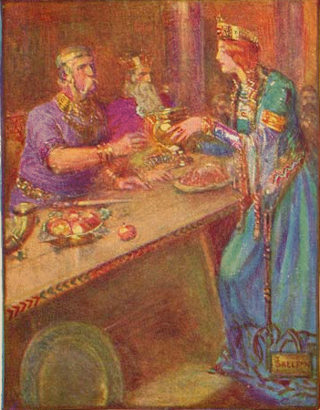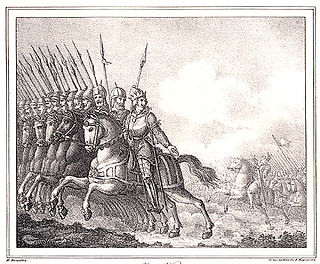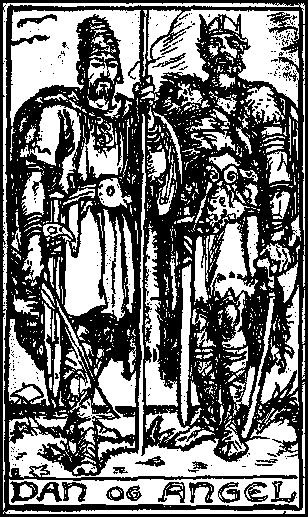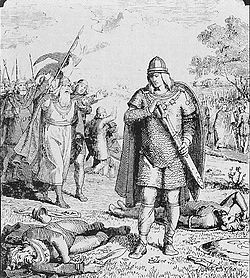
Offa is a semi-legendary king of the Angles in the genealogy of the kings of Mercia presented in the Anglo-Saxon Chronicle. He is the son of Wermund and the father of Angeltheow. His name is also mentioned in the Old English poem Widsith. He has been identified with Uffo, a legendary Danish king in the Gesta Danorum by Saxo Grammaticus.

Hrólfr Kraki, Hroðulf, Rolfo, Roluo, Rolf Krage was a semi-legendary Danish king who appears in both Anglo-Saxon and Scandinavian tradition.

Hrothgar was a semi-legendary Danish king living around the early sixth century AD. Many years later, Hrothgar paid money to the Wulfings to resolve a blood feud they had with Ecgtheow, Beowulf's father.
Fróði is the name of a number of legendary Danish kings in various texts including Beowulf, Snorri Sturluson's Prose Edda and his Ynglinga saga, Saxo Grammaticus' Gesta Danorum, and the Grottasǫngr. A Danish king by this name also appears as a minor character in the Middle High German epic Rabenschlacht. The name is possibly an eponym for the god Freyr.

The Ynglings were a dynasty of kings, first in Sweden and later in Norway, primarily attested through the poem Ynglingatal. The dynasty also appears as Scylfings in Beowulf. When Beowulf and Ynglingatal were composed sometime in the eighth to tenth centuries, their respective authors expected their audience to have a great deal of background information about these kings, which is shown in the allusiveness of the references.

Eadgils, Adils, Aðils, Adillus, Aðísl at Uppsölum, Athisl, Athislus or Adhel was a semi-legendary king of Sweden, who is estimated to have lived during the 6th century.

Yrsa, Yrse, Yrs or Urse was a tragic heroine of early Scandinavian legend. She is typically characterized as the wife of Swedish king Eadgils and mother of Danish king Hrólfr Kraki.
Finn, son of Folcwald, was a legendary Frisian king. He is mentioned in Widsith, in Beowulf, and in the Finnesburg Fragment. He is named in the Historia Brittonum, while a Finn, given a different father but perhaps intending the same hero, appears in Anglo-Saxon royal pedigrees.
Various gods and men appear as sons of Odin in Old Norse and Old English texts.
Dan (or Halfdan) is the name of one or more of the legendary earliest kings of the Danes and Denmark, as mentioned in medieval Scandinavian texts.
The Scyldings or Skjǫldungs, both meaning "descendants of Scyld/Skjǫldr", were, according to legends, a clan or dynasty of Danish kings, that in its time conquered and ruled Denmark and Sweden together with part of England, Ireland and North Germany. The name is explained in many texts, such as Friedrich Christoph Dahlmann's 'Research on the Field of History', by the descent of this family from an eponymous king Scyld, but the title is sometimes applied to rulers who purportedly reigned before him, and the supposed king may be an invention to explain the name. There was once a Norse saga on the dynasty, the Skjöldunga saga, but it survives only in a Latin summary by Arngrímur Jónsson.

Halfdan was a late 5th and early 6th century legendary Danish king of the Scylding (Skjöldung) lineage, the son of king named Fróði in many accounts, noted mainly as the father to the two kings who succeeded him in the rule of Denmark, kings named Hroðgar and Halga in the Old English poem Beowulf and named Hróar and Helgi in Old Norse accounts.

Halga, Helgi, Helghe or Helgo was a legendary Danish king living in the early 6th century. His name would in his own language (Proto-Norse) have been *Hailaga.

Heoroweard is a character who appears in Beowulf and also in Norse legends, where he is named Hjörvarðr or Hiartuar. If he existed in real life, his name would have been Proto-Norse *Heruwarduz.

The Angles were a dominant Germanic tribe in the Anglo-Saxon settlement of Britain, and gave their name to the English, England and to the region of East Anglia. Originally from Angeln, present-day Schleswig-Holstein, a legendary list of their kings has been preserved in the heroic poems Widsith and Beowulf, and the Anglo-Saxon Chronicle.
Wihtlæg, Whitlæg, Wighlek, Wiglecus, Wiglek, Witlac or Viglek is a legendary king of either Denmark or Angeln in Germanic legends. He is known in Saxo's kings of Denmark by the name of Vigletus.
Freawine, Frowin or Frowinus figures as a governor of Schleswig in Gesta Danorum and in the Anglo-Saxon Chronicle as an ancestor of the kings of Wessex, but the latter source only tells that he was the son of Friðgar and the father of Wig.

Ket and Wig appear in the Gesta Danorum as the sons of Frowin, the governor of Schleswig. Wig also appears in the Anglo-Saxon Chronicle as the son of Freawine (Frowin) and father of Gewis, eponymous ancestor of the kingdom of Wessex and their kings, but this is thought to be a late manipulation, inserting these heroes into a pedigree borrowed from a rival royal house, in which the Bernician eponym Bernic was replaced by the Wessex Gewis.

Angul is a figure in Nordic mythology who, according to the Gesta Danorum was the ancestor of the Danes, along with his brother Dan. He was also the ancestor of the Angles in Denmark, who later migrated to Great Britain, naming the land they settled England.
A number of royal genealogies of the Anglo-Saxon kingdoms, collectively referred to as the Anglo-Saxon royal genealogies, have been preserved in a manuscript tradition based in the 8th to 10th centuries.











